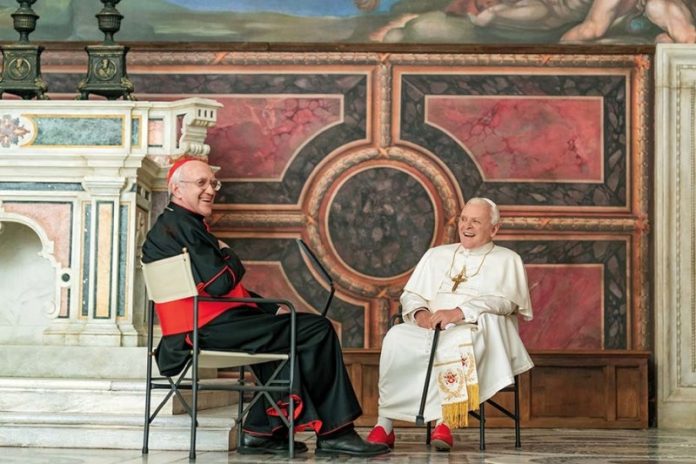One of the most poignant moments in the new Netflix film The Two Popes is a moment of supreme exasperation. The individuals at the center of the film — soon-to-be-retired Pope Benedict XVI and soon-to-be-Pope Jorge Bergolio (now Francis) — have spent the past few minutes disagreeing on every issue facing the Catholic church: homosexuality, divorce, celibacy, the environment and the sexual misconduct of priests. At last, Cardinal Bergolio says, mournfully, “It seems to me that we are no longer a part of this world. We do not belong to it. We are not connected.” Pope Benedict XVI considers this, and then, quoting Anglican priest William Inge, replies, “A church that marries the spirit of this age —” Bergolio interrupts him with the rest of the quotation: “—will be widowed in the next.”
To me, this scene perfectly encapsulates the debate raging around the issue of celibacy in the Catholic Church. To those outside of it, the practice seems archaic and baffling. Why shouldn’t priests be allowed to marry? What good is it doing? Is it actually doing harm? Even to some within Catholicism, it seems like a superfluous practice, especially when stacked against problems with far more impact. And yet, there are those within the Church who believe that this issue cannot and should not be compromised on. To change the practice of celibacy would alter centuries of tradition and the work of generations of God-fearing servants.
Should we change simply because the world says we should?
Pope Benedict XVI believes the Church should not, and he is making his view abundantly clear through a series of arguments in the French newspaper Le Figaro and in a newly published book. In 2013, after becoming the only pope since 1415 to retire, Pope Benedict promised that he would stay “hidden from the world.” However, he has broken his silence to argue for the “great significance” of celibacy and calling it a “truly essential” standard for priesthood. In the book, co-authored with Cardinal Robert Sarah, Pope Benedict states definitively that “the call to follow Jesus is not possible without this sign of freedom and of renunciation of all commitments.”
The sudden outspokenness of the former pope is seen by many as a response to Pope Francis considering a change in the Church’s position on celibacy. Last year, stemming from a shortage of priests in the Amazon region, church leaders from South America requested that married men be allowed to be ordained. Pope Francis is apparently working on a document that tackles this issue, which has made Catholic hardliners nervous. In the past, Pope Francis has expressed a willingness to reconsider the practice of celibacy. In 2014, in a conversation with journalists, Pope Francis admitted that, while he did consider celibacy “a rule of life that I greatly appreciate,” he did not view the practice as “a dogma of faith,” so “the door is always open.”
The Catholic Church, like any political institution, has always been at war with itself, the traditionalists and the reformers duking it out behind closed doors. What is unique about this situation, though, is that each camp has a champion out in the open, and both have sat on the Chair of St. Peter. For some, the real issue at hand is that there are two living popes, commenting on and providing conflicting guidance for Catholics around the world.
SOURCE: Christian Post, Hayden Royster
All Content & Images are provided by the acknowledged source



